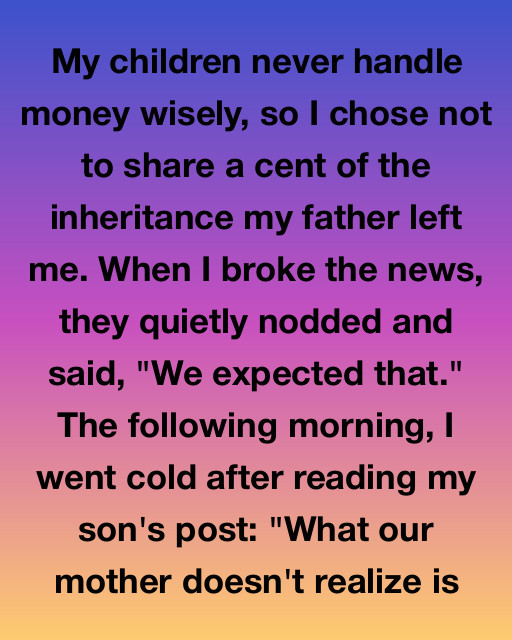
I told my children I wouldn’t be sharing a cent of my father’s inheritance. I said it calmly, like a woman making a prudent decision—one I’d justified for years by labeling them “unwise with money.” Ethan and Clara nodded without protest. “We expected that,” they said. I took their quiet as confirmation that I was right.
The next morning, I found Ethan’s post on his private account. “What our mother doesn’t realize is that the money she’s clinging to is a fraction of what we earn every quarter, and she’s been unknowingly living off our ‘unwise’ earnings for the last three years.” My stomach dropped. Rage flared, then confusion. If they were mocking me, it worked; if they were telling the truth, I had misjudged them in ways I could barely fathom.
I went straight to Ethan’s apartment, elbowing past synthesizers and cables, demanding answers. “Are you lying? Is this illegal? Where is the money coming from?” He didn’t flinch. He gestured to a second workstation I’d never noticed—sleek, clinical, nothing like the music setup. “It’s real,” he said evenly. “And it’s clean. We just didn’t want to invite judgment because it isn’t ‘corporate.’”
He told me that three years ago, when my consulting contract vanished and I started living on inherited dividends, he and Clara had watched my anxiety build. They created an anonymous trust named The Sycamore Foundation—after my father’s favorite tree—to cover my mortgage, utilities, and insurance. The deposits appeared as dividends from a forgotten stock. I’d called it prudent investing. It was my children, quietly keeping me steady.
I asked where the principal came from—because it couldn’t be artist’s royalties and good intentions. Ethan opened a ledger and let me read. The “struggling musician” label I’d handed him cracked and fell away. He was an acoustic engineer who had developed and patented a specialized active noise-cancellation system for hospitals and schools—spaces where children with severe sensory processing disorders needed quiet to function. His licensing deals ran across hundreds of facilities. The trust paid my bills from his patent income. The studio I’d dismissed was a sound lab. The faded T-shirt and jeans were a uniform for work I’d never bothered to ask about.
We drove to see Clara next. I’d visited her workplace before and assumed the newly renovated building was a grant-fed nonprofit. It was, in fact, her life’s work: The Sycamore Center, a comprehensive, low-cost therapy and education hub for children with complex sensory needs. Clara wasn’t merely a social worker; she was the founding director. Ethan’s noise-cancellation technology was the backbone of the center’s environment, and his licensing income was its primary funding stream. Their “bad money sense” had built a sanctuary.
There, in a sunlit hallway softened by quiet that felt almost holy, Clara brought out an old album and opened to a photograph of a beautiful infant boy. “Elias,” she said. “Your firstborn. He lived two days.” The world shifted under my feet. I remembered my father’s long silences, my own decision never to speak about that winter, and the way grief had taught me to lock doors from the inside.
Clara explained that after Elias died, our family stopped saying his name, as if silence could spare us. My father never recovered from the guilt and the helplessness he felt when specialists had nothing to offer. In the years that followed, he quietly amassed funds with a single intention: that the next child like Elias would have a place to be helped rather than lost. The inheritance I guarded was meant as seed capital for that purpose. He had named me executor because I was “responsible,” trusting I would listen when my children eventually revealed the plan only they could carry out.
I stood in the center’s hushed atrium and understood what I’d done. I hadn’t been protecting a legacy; I’d been hoarding it. My children—the ones I’d classified as reckless—had already fulfilled my father’s final wish without fanfare, disguising their care as dividends so that my pride could survive the truth.
I called my lawyer that afternoon—not to shield assets, but to release them. We transferred the entire inheritance into The Sycamore Center’s endowment, irrevocably. No symbolic checks. No half-measures. I drafted my resignation from corporate consulting and accepted a full-time role as the center’s chief financial strategist. My expertise would stop guarding wealth and start growing a mission.
Working alongside Ethan and Clara, I learned the accounting of a different bottom line. We tracked impact, not status. We modeled long-range budgets in tandem with research pilots. We measured returns in therapy hours underwritten, classrooms adapted, and families who finally exhaled because their child could breathe in a quieter world. I watched my son negotiate a multinational licensing agreement in the morning and help a technician recalibrate a sensory room in the afternoon. I watched my daughter testify for equitable insurance coverage and then sit on the floor with a child who needed a hand to hold.
Here is what I know now: I mistook compliance with my definition of success for maturity and called it wisdom. I mistook titles for proof and dismissed purpose because it wasn’t dressed for an earnings call. My father left money, yes—but the true inheritance was a mandate: heal what our silence could not.
If you’re lucky, your children will outgrow the measures you place on them. If you’re humble, you’ll let them. And if you’re wise, you’ll invest what you’ve been guarding into the work that redeems your family’s deepest wound. That’s what we did. That’s what I almost stopped. And that’s what I will spend the rest of my life protecting—alongside the two people I once called “unwise,” who taught me what stewardship really means.